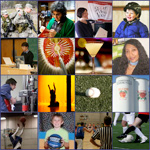Cadet training
Students prepare to become officers and leaders
A local shop offers a tactile experience in a digital age Making a business of love
Wendy Strgar works to change society's view of intimacy Slow and steady wins this race
Developmental delays are no match for Tegan Wright Celebrating Spielberg
The English Department showcases the director's work A celebration of culture
The Elmira Pow-Wow honors veterans, elders and diversity A fresh approach to cocktails
It's the ingredients at Bel Ami Lounge From Quito to Eugene
A student's journey from the Universidad to the University Death Saddle
Three students try a new sound in a new band Behind the scenes
What goes on to make the show go on at the EMU Baseball is back
The sport returns to the university after 28 years Thompson's Mills
The oldest water-powered grain mill in the state A chance to shine
Intramural basketball provides an equal opportunity Lessons in teamwork
YMCA youth basketball molds future athletes Making the right call
Students find that officiating isn't as easy as it looks A soccer tradition
Local players get together to keep the game alive

Drums, dance and rhythm
A local community gathers to celebrate the diversity and dynamics of Native American cultures
By Kelli CurtisThe sweet smell of fry bread coated in powdered sugar and cinnamon wafts through the gymnasium as low rumbles of drums pulsate, tremble and swell. Throaty voices rise above the din, making sounds but no words.
...Nearly 500 participants mingled, danced and moved with the rhythms on Feb. 7 at the 25th annual Elmira Pow-Wow.
In what Alan Merrill, the first-year coordinator of the event, called a success, local community members gathered to celebrate Native American cultures, honor veteran elders and encourage youth participation in traditions.
"A Pow-Wow is a time for Native peoples on this continent to get together in celebration and ceremony and share things that have been going on in their lives," said Jerry Hall, a member of a local Native community. The celebration is meant for people to dance, pray and carry on traditions and traditional ways of celebrating, he said.
This year's Pow-Wow cut the number of vendors, from 50 in years past to approximately 20 this year, in order to increase the amount of dancing space available to participants. The Pow-Wow sought to encourage more community involvement and to encourage the youth to honor and learn traditions.
Much of the Pow-Wow placed emphasis on respecting and honoring Native American military veterans, who are chosen individually to lead the grand entry processional, which occurs twice per Pow-Wow. Native American cultures are the only ones to honor veterans twice per day per event, said Tim Thompson, an Oklahoma-born Native American.
The veterans carry eagle staffs, which are meant to honor Native American cultures, that lead the entry, followed by the American and state flags. Thompson, a Marine veteran, explained that significance in terms of honoring his family and culture first, though he would still proudly die for the American flag.
...Feet tap and glide to the dynamic sounds consuming the gymnasium while the audience stands in reverence, watching the grand entry and the processional of the vibrant colors, flags and faces, alit with cultural pride.
